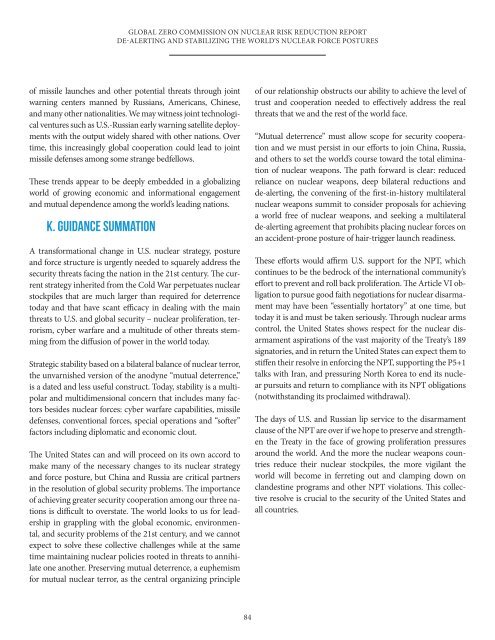global_zero_commission_on_nuclear_risk_reduction_report
global_zero_commission_on_nuclear_risk_reduction_report
global_zero_commission_on_nuclear_risk_reduction_report
Create successful ePaper yourself
Turn your PDF publications into a flip-book with our unique Google optimized e-Paper software.
GLOBAL ZERO COMMISSION ON NUCLEAR RISK REDUCTION REPORTDE-ALERTING AND STABILIZING THE WORLD’S NUCLEAR FORCE POSTURESof missile launches and other potential threats through jointwarning centers manned by Russians, Americans, Chinese,and many other nati<strong>on</strong>alities. We may witness joint technologicalventures such as U.S.-Russian early warning satellite deploymentswith the output widely shared with other nati<strong>on</strong>s. Overtime, this increasingly <str<strong>on</strong>g>global</str<strong>on</strong>g> cooperati<strong>on</strong> could lead to jointmissile defenses am<strong>on</strong>g some strange bedfellows.These trends appear to be deeply embedded in a <str<strong>on</strong>g>global</str<strong>on</strong>g>izingworld of growing ec<strong>on</strong>omic and informati<strong>on</strong>al engagementand mutual dependence am<strong>on</strong>g the world’s leading nati<strong>on</strong>s.K. GUIDANCE SUMMATIONA transformati<strong>on</strong>al change in U.S. <strong>nuclear</strong> strategy, postureand force structure is urgently needed to squarely address thesecurity threats facing the nati<strong>on</strong> in the 21st century. The currentstrategy inherited from the Cold War perpetuates <strong>nuclear</strong>stockpiles that are much larger than required for deterrencetoday and that have scant efficacy in dealing with the mainthreats to U.S. and <str<strong>on</strong>g>global</str<strong>on</strong>g> security – <strong>nuclear</strong> proliferati<strong>on</strong>, terrorism,cyber warfare and a multitude of other threats stemmingfrom the diffusi<strong>on</strong> of power in the world today.Strategic stability based <strong>on</strong> a bilateral balance of <strong>nuclear</strong> terror,the unvarnished versi<strong>on</strong> of the anodyne “mutual deterrence,”is a dated and less useful c<strong>on</strong>struct. Today, stability is a multipolarand multidimensi<strong>on</strong>al c<strong>on</strong>cern that includes many factorsbesides <strong>nuclear</strong> forces: cyber warfare capabilities, missiledefenses, c<strong>on</strong>venti<strong>on</strong>al forces, special operati<strong>on</strong>s and “softer”factors including diplomatic and ec<strong>on</strong>omic clout.The United States can and will proceed <strong>on</strong> its own accord tomake many of the necessary changes to its <strong>nuclear</strong> strategyand force posture, but China and Russia are critical partnersin the resoluti<strong>on</strong> of <str<strong>on</strong>g>global</str<strong>on</strong>g> security problems. The importanceof achieving greater security cooperati<strong>on</strong> am<strong>on</strong>g our three nati<strong>on</strong>sis difficult to overstate. The world looks to us for leadershipin grappling with the <str<strong>on</strong>g>global</str<strong>on</strong>g> ec<strong>on</strong>omic, envir<strong>on</strong>mental,and security problems of the 21st century, and we cannotexpect to solve these collective challenges while at the sametime maintaining <strong>nuclear</strong> policies rooted in threats to annihilate<strong>on</strong>e another. Preserving mutual deterrence, a euphemismfor mutual <strong>nuclear</strong> terror, as the central organizing principleof our relati<strong>on</strong>ship obstructs our ability to achieve the level oftrust and cooperati<strong>on</strong> needed to effectively address the realthreats that we and the rest of the world face.“Mutual deterrence” must allow scope for security cooperati<strong>on</strong>and we must persist in our efforts to join China, Russia,and others to set the world’s course toward the total eliminati<strong>on</strong>of <strong>nuclear</strong> weap<strong>on</strong>s. The path forward is clear: reducedreliance <strong>on</strong> <strong>nuclear</strong> weap<strong>on</strong>s, deep bilateral reducti<strong>on</strong>s andde-alerting, the c<strong>on</strong>vening of the first-in-history multilateral<strong>nuclear</strong> weap<strong>on</strong>s summit to c<strong>on</strong>sider proposals for achievinga world free of <strong>nuclear</strong> weap<strong>on</strong>s, and seeking a multilateralde-alerting agreement that prohibits placing <strong>nuclear</strong> forces <strong>on</strong>an accident-pr<strong>on</strong>e posture of hair-trigger launch readiness.These efforts would affirm U.S. support for the NPT, whichc<strong>on</strong>tinues to be the bedrock of the internati<strong>on</strong>al community’seffort to prevent and roll back proliferati<strong>on</strong>. The Article VI obligati<strong>on</strong>to pursue good faith negotiati<strong>on</strong>s for <strong>nuclear</strong> disarmamentmay have been “essentially hortatory” at <strong>on</strong>e time, buttoday it is and must be taken seriously. Through <strong>nuclear</strong> armsc<strong>on</strong>trol, the United States shows respect for the <strong>nuclear</strong> disarmamentaspirati<strong>on</strong>s of the vast majority of the Treaty’s 189signatories, and in return the United States can expect them tostiffen their resolve in enforcing the NPT, supporting the P5+1talks with Iran, and pressuring North Korea to end its <strong>nuclear</strong>pursuits and return to compliance with its NPT obligati<strong>on</strong>s(notwithstanding its proclaimed withdrawal).The days of U.S. and Russian lip service to the disarmamentclause of the NPT are over if we hope to preserve and strengthenthe Treaty in the face of growing proliferati<strong>on</strong> pressuresaround the world. And the more the <strong>nuclear</strong> weap<strong>on</strong>s countriesreduce their <strong>nuclear</strong> stockpiles, the more vigilant theworld will become in ferreting out and clamping down <strong>on</strong>clandestine programs and other NPT violati<strong>on</strong>s. This collectiveresolve is crucial to the security of the United States andall countries.84


